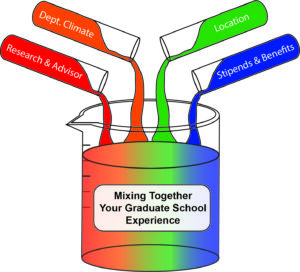How to Pick a Program
Identify What Components Are Most Important to You
Congratulations on your acceptance to graduate school! Once you have received award letters, it’s time to decide where to attend! There are a wide variety of topics that can influence your decision and every decision is personal to the individual. A few topics that can impact this decision are outlined below.
Pick an Institution Where the Research Interests You
- Make sure a program’s/principal investigator’s research interests align with yours. Remember, you’ll be working in this field for 5+ years! Make sure you are happy with what you are studying!
- Some go to graduate school knowing exactly what topic they’d like to study. However, many don’t! Picking a program with a breadth of research opportunities can be valuable, especially when it comes time to choosing a research advisor (see below).
Ensure There are Several Advisors You’d Like to Work Under
- Pick an institution where you would be happy working for at least 3 advisors. Some universities ensure you’ll receive your 1st choice in research advisor. However, most do not. Instead, joining a group is reliant on a variety of components, including funding situations, number of students on pre-existing projects/grants, and competition between other students in your cohort. Therefore, it is best to pick a university where you would be happy working for multiple advisors, especially if you feel these factors will come into play.
- You may also find that other factors (i.e. mentoring style, PI expectations, work-life balance, etc.) may deter you from joining a group, but only find out once you have enrolled. Choosing a school with several group opportunities can provide flexibility, even after you choose your program!
Consider Departmental and Research Group Climates
- Overall department and group climate can be a difficult criterion to gauge, especially from a distance. Therefore, a great option is to discuss group and department dynamics with students at visitation weekends or via email. Some sample questions to ask are below.
- What type of mentorship style does the PI have? (i.e. hands-on/hands-off, easy/hard to get a hold of)
- How often does the group/other graduate students hang out outside of lab?
- What do graduate students do for fun when they aren’t in lab?
- What is the group’s funding situation?
- Do most students in a group teach or are they placed on a research assistantship?
- What does a typical work week look like in your lab?
- Are there interest groups, clubs, and/or student organizations within the department?
- Visitation Weekends can also provide experiential opportunities to gauge departmental and research group climates that are difficult to gauge over conversations. Some example criteria are below.
- Group dynamics (i.e. Is the group social or more reserved?)
- Diversity
- Approachability of students, faculty, etc.
- Happiness of graduate students (i.e. Are the graduate students excited to talk about their research, group and/or PI?)
Consider Stipend & Benefits
- Consider the cost of living associated with the program’s location. Depending on your stipend, you may be able to afford a single-bedroom apartment, whereas other stipends may require you to live with roommates.
- Some programs offer added benefits, such as health insurance coverage and/or pay for student fees, while others require you to pay out-of-pocket.
Consider Location
- Moving can be expensive! Consider whether you have the means to move to your program.
- Consider the cost of living. Colleges and universities in cities are historically more expensive than those in the suburbs/rural areas.
- Distance from family and friends. Graduate school can take you away from or bring you closer to friends and family.
- Resources:
- https://livingwage.mit.edu/
- Shows local living wages for different regions
- Can be used to independently determine cost of living versus graduate school stipend offers
- http://www.phdstipends.com/
- Lists stipends for academic disciplines across various U.S. universities
- https://livingwage.mit.edu/

